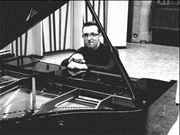Tutor HuntResources Piano Resources
Music Therapy
This article presents the most recent figures from literature about the effects of music on a psychological level.
Date : 10/02/2014
Author Information

Uploaded by : Nicolae
Uploaded on : 10/02/2014
Subject : Piano
THE RELAXING EFFECT
In the case of tiredness after a long and tense activity, it is recommended to listen to slow pieces of music that helps you relax and throws you into a state of meditation. For example, an andante from the piano sonatas composed by Haydn or Mozart, the second movement from Beethoven's piano Concertos or Debussy's Nocturnes.
If suffering of a pathological fatigue or for patient with neurotic problems it is highly recommended to listen to stimulating rhythmic pieces. For example, the third movement of a piano sonata by Mozart.
Music therapy has a strong effect on language development, enriching the vocabulary by increasing the capacity to learn new words. These effects were evident on children with language difficulties.
POTENTIATING OF INTELLECTUAL MENTAL PROCESSES
Listening especially to Mozart's music but also other composers (Bach, Vivaldi, Beethoven, Brahms) and musical training has positive effects on cognitive mental processes such as spatial thinking, the use of mathematical concepts, problem solving, attention and memory. Thereby, Music is used in education for improving learning styles and in medicine to improve mental performance of the elderly people ore help patients suffering of Alzheimer.
This is just a brief example of the good things that music broth in our life
With every musical territory conquered, we add a new string to our sensitivity. Music is an admirable way to purify our body and our soul.
This resource was uploaded by: Nicolae
